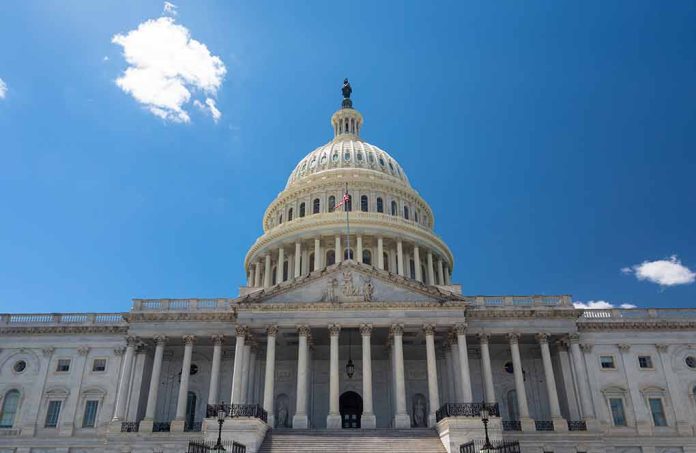
Democrats Block Voter ID Requirement in Spending Bill, Risking Government Shutdown
At a Glance
- House Speaker Mike Johnson pulled a six-month stopgap spending bill that included a voter ID requirement
- Democrats and some Republicans oppose the bill, with the White House calling it a “poison pill”
- Former President Trump urged Republicans not to support any short-term spending measure without the voter ID provision
- The government could face a partial shutdown if a compromise isn’t reached
- Senate leaders suggest they may step in if the House fails to act
Democrats Stand Firm Against Voter ID in Spending Bill
House Democrats are taking a hard line against the inclusion of a voter ID requirement in a stopgap spending bill, potentially pushing the government to the brink of a partial shutdown. House Speaker Mike Johnson’s decision to withdraw the six-month funding bill highlights the deep partisan divide over election security and voter rights.
The controversial bill, which would have required ID to register to vote in federal elections, faced staunch opposition from Democrats and even some Republicans. House Minority Leader Hakeem Jeffries made it clear that his caucus would not support any temporary funding measure extending into 2025 or including proof of citizenship requirements for voter registration.
143 House Democrats voted AGAINST prohibiting non-citizens from voting in our nation’s capital city.
198 House Democrats voted AGAINST requiring proof of U.S. citizenship for voter registration.
202 House Democrats voted AGAINST returning a question on U.S. citizenship to the…
— Rep. Andrew Clyde (@Rep_Clyde) September 10, 2024
Republican Efforts to Secure Elections Face Roadblocks
Speaker Johnson, backed by many conservative Republicans, argues that the voter ID provision is crucial for election integrity. However, this stance has put him at odds with not only Democrats but also some members of his own party.
“We’re going to continue to work on this. The whip is going to do the hard work and build consensus. We’re going to work through the weekend on that,” Johnson told reporters. “And I want any member of Congress, in either party, to explain to the American people why we should not ensure that only U.S. citizens are voting in U.S. elections.”
Despite Johnson’s determination, the bill faces significant hurdles. The White House has threatened a veto, labeling the voting provision a “poison pill.” With a narrow 220-211 Republican majority in the House, Johnson’s leverage is limited, and he needs near-unanimous GOP support to pass any legislation without Democratic votes.
Trump’s Influence and the Threat of Government Shutdown
Adding fuel to the fire, former President Donald Trump has urged Republicans to stand firm on including the voter ID provision, even if it means risking a government shutdown. This stance has emboldened some conservative members but worried others who fear the political consequences of a shutdown.
However, not all Republicans are on board with this strategy. Senate Republican leader Mitch McConnell has openly opposed a government shutdown, highlighting the divide within the party over how to approach this issue.
Senate Prepared to Step In
As the House struggles to find a path forward, some senators are signaling their readiness to intervene. Maine Sen. Susan Collins has suggested a stopgap bill lasting through mid-December, while West Virginia Sen. Shelley Moore Capito indicated the Senate might act if the House fails to do so.
“Is it any surprise that the speaker’s purely partisan CR seems to be running into trouble?” Senate Majority Leader Chuck Schumer said, using Washington parlance for the short-term continuing resolution needed to prevent a shutdown. “The answer is very simple. The House should stop wasting time on a CR proposal that cannot become law.”
The clock is ticking, and with the November 5th presidential election looming, the pressure is mounting on both parties to find a compromise. As it stands, the American people are left wondering whether their government will remain fully operational or if partisan gridlock will once again lead to a costly and disruptive shutdown and a questionable election outcome.






















